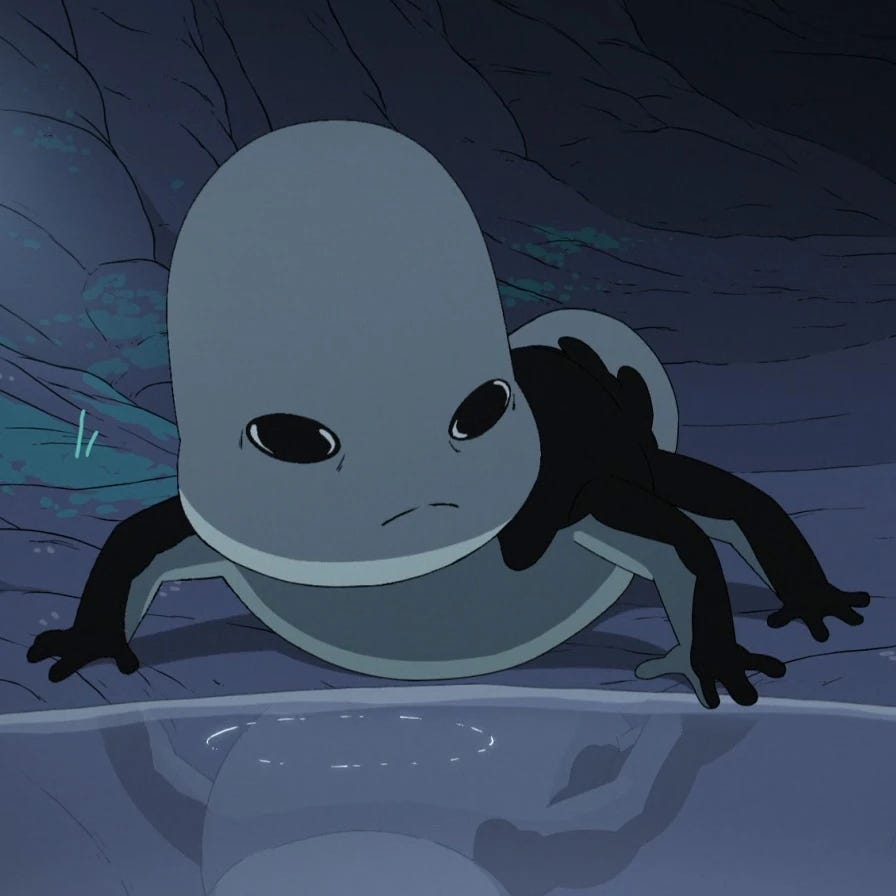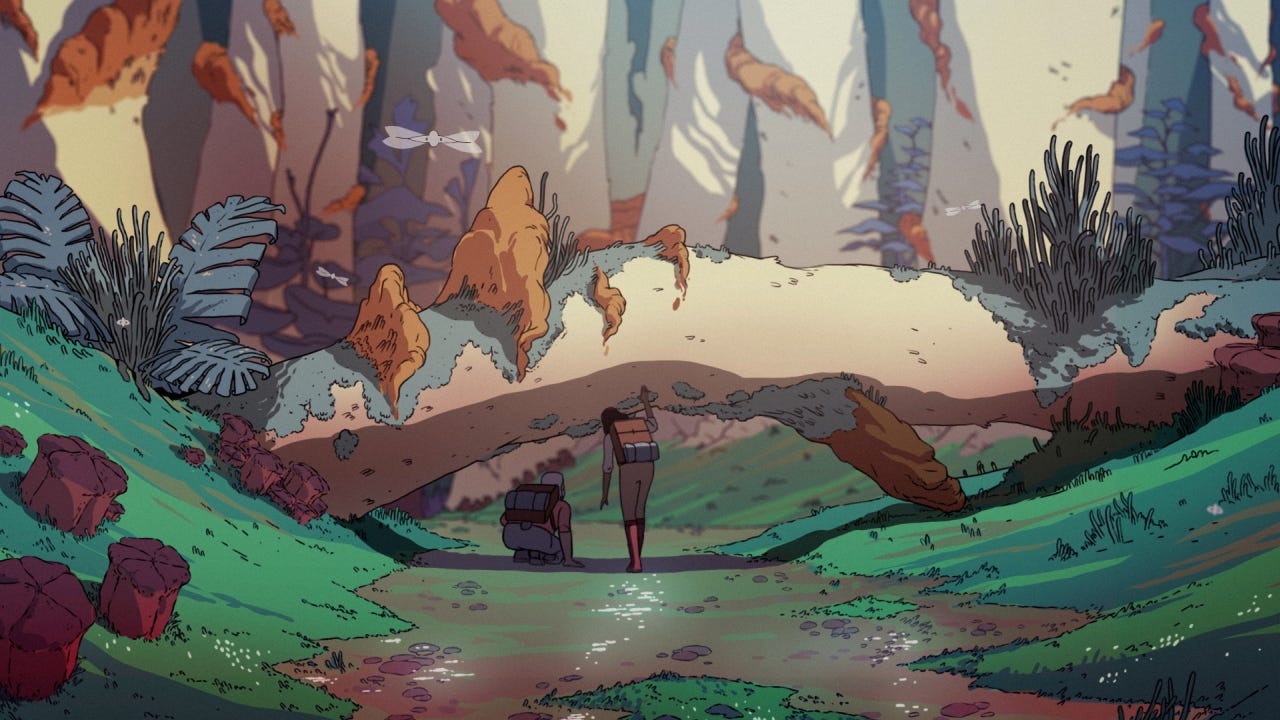Scavengers Reign
Once again I am writing about something which I feel most of my readers will be aware, but in this case it’s a rare piece of popular art that I really liked so I want everyone to know about it.
The Science-Fiction animation 'Scavengers Reign', was made for HBO (and unavailable in the U.K.), and it looks like it has been cancelled there. BUT it has moved to Netflix where I can actually see it. This is my attempt to make sure we get a second series.
The series is based on this short, ‘Scavengers’;
Twelve 20+ minute episodes of western-stye animation about the survivors of a crashed space ship trying to survive on an alien world with a fecund, bounteous, and incredibly dangerous biosphere.
As the "Demeter" suffers massive damage the waking crew escape to the planet below in survival pods while the majority are still asleep in cryo. On the surface, the ships Captain manages to jury-rig a signal to bring the Demeter down to the planet intact.
Three groups of separated survivors see the Demeter come down. All they needs to do is reach the grounded ship and re-awaken the crew before something kills them or power runs out, and then use the ships lifeboat to leave the planet and go to summon help.
To get there they will have to cross a world of gorgeous bounty and cornucopic terrors.
The incredible fecundity of invention in the environment of Vesta Minor, creates a sense-making baroque Speculative-Evolution Rhapsody which turns its hyper-complex environment of endless transformations and predation into a gorgeous problem to solve, and also a kind of Pilgrims-Progress hajj of transmutation of the identity and soul.
The environment of Vesta Minor is both alien and fecund but more beautiful than its general forms would be alone, (many Science Fiction stories can create mere visual rhapsodies), is the locking together of the logic of life in which every living thing seems to have its own coherent place, purpose, method and cycle of life. Curlicues of white spiral through the air and fasten to white spars, perfectly camouflaged, until a storm disturbs them and they cloud away, like grey petrels flocking in flight from a grey sea, Cambrian-radial megafauna wander across grasslands, ridden by scatterings of minor species. The hyperdeveloped environment is host to wild schemes of parasitism, symbiosis and simulacra, and complex games of signalling and counter-signalling.
SPOILERS BELOW!
Transhumanism, Parasites, Symbioses and Identity
The story follows three groups of survivors; The first is Human/Human; the ships captain and natural history lady (now the most useful human alive), one human/robot and one human/weird frog thing.
By the end of the series the only one left we are sure is human is the lady with the robot. The captain has been parasitised by a mind-altering plant, the ships natural history lady may be a fungal simulacra, but we are not sure, the robot has been infected with a fungal strain and reborn as a new kind of cyborg, and the lone male survivor is rapidly brought into a symbiotic relationship with a mind-controlling predator.
Constant and unalterable transformation is a main theme of the story and the only periods or places of stability lie in accepting or negotiating some level of alteration rather than resisting all.
The Captain is poisoned by one plant, which steals some genes and grows a very rough simulacrum of him, the main purpose of which is just to get close to the herd, (it usually preys on cowlike animals), and explode, poisoning the rest of the group and fertilising the ground beneath for the plants seed, left behind in the pseudo-captains flesh.
Then he is saved by the bio-medical knowledge of a mute survivor left behind by a previous expedition, who it turns out is a symbiote herself, of a different cave-dwelling entity. Yet clearly this woman has some selfhood left, she can perform complex actions, still visits her husbands grave, but in other ways is entirely the creature and servant of the entity. She saves his life but infects him with this fresh form of life.
The Captain then watches his own behaviour change, only half realising as his basic urges and desires are subverted by the plantlike organism growing inside him, which is keeping him alive but, mutely and instinctively, is trying to turn him into an agent to create and sustain its preferred environment.
The lone male survivor is trapped in their pod, high up in trees and is slowly starving to death. He is retrieved by the 'Hollow', a somewhat intelligent froglike thing with limited psychokinetic and mind-altering powers.
Most Hollows walk around on branches peering at little bugs or mouselike entities. If they can fixate one, they can parasitise it, subverting its behaviour so that it brings the Hollow food.
One tries this on the lone survivor and it works. It speaks to him through memory, illusion and instinct, transforming him into a food-gatherer. It’s pretty clear that, at least to begin with, the Hollow doesn't understand much or anything about the buttons it is pressing. If it wants its Gatherer to get food, or to stay, or follow, or be happy, it just presses on the memory/emotion complex in the humans head and the human mind does the rest, creating complex dreams, hallucinations and desires to achieve these ends.
But this Gatherer is a sentient self-aware and quite intelligent human, and in order to gather ever-more food, he takes to tool-use, traps, ambush, throwing spears and persistence hunting, making this combination of Hollow and Human Gatherer an abnormally insanely successful system, and making the Hollow a FUCKING UNIT.
As this happens it seems that the Hollow itself is being poisoned, or altered by the infiltrating visions of its human Gatherer. We never know how much the Hollow understands of what it sees in the human mind, or of what emotions it shares, but it ends up making a pilgrimage to the Demeter itself and treats the place as a kind of preferred lair or hunting place, trying to kill or drive off whatever else turns up.
It’s possible that nothing on Vesta Minor is self-aware or intelligent in an way we can understand, but so many of its species can subvert, parasitise or enter symbiosis with humans, which we know are self-aware, we have to ask; what then is the nature of the soul which results?
Many of these effects are horrific but this is not a horror series. The tone and form of the storytelling accept these changes evenly and clearly, with a kind of acceptance similar to that of a Ballard story. What results might be called Environmental Horror, Speculative-Evolution Porn, Alien World Survival Show or Transmutation Drama. It has a little of the Tempest, a little Dougal Dixon, some David Attenborough and a dab of William Golding.
Is this planet actually more complex than earth, or just so strange that it seems so?
In a sense Vesta Minor is "Life-Horror/Wonder" or "Evolution Horror". All the systems and ideas of life’s interaction, transformation and evolution on Vesta Minor are drawn from or influenced by that of our world, but re-enchanted or make strange by their incredible new forms and the complexity and subtlety of their interactions.
If Vesta Minor causes us Awe, or Horror , or Wonder, this is in some sense only because those processes should cause such emotion, yet we are blind to their day-to-day nature here due to overfamiliarity. When recast on an alien world through a Wunderkammer of alien forms, the same processes and logic amaze and astound us.
(Nerd Shit - If Vesta Minor was real and people landed there, even if they could breathe, most likely the viruses and bacteria would infect them and eat them alive within a day.
Possible reasons they might not include; not being adapted to live inside humans, the humans having some kind of sci-fi inbuilt auto-immune system either via genetic alteration or implant, or Vesta Minor microsphere for some magical reason, not being as incredibly hyper-complex as its macro-scale biosphere.)
It’s really a lovely non-stupid dream of a series so if you are a lover of Science Fiction or strange things and are very tired of fucking stupid stuff then please give it a go.
The ending does have slight Gaia-vibes, which is something it managed to avoid up until that point. It’s kind of boring if the planet has a Mind because that answers a lot of the complex moral questions to do with encountering an alien environment.










Patrick, I think this is possibly heavily influenced by the French scifi comics of Leo. In any event, they are worth checking out as being very similar in theme and art. https://www.cinebook.co.uk/aldebaran-catastrophe-p-3990.html
My friend Jfur summarised this series very well I think:
“i think it not only manages to pull off actually represnting what "alien" means in such a profound way, but also through the lens of the alien put a mirror to the sublime and alien nature of our own ecosystem.”